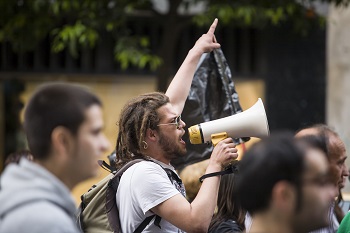

This work is licensed under a Creative Commons Attribution-NonCommercial 4.0 International License.
Authors who publish with this journal agree to the following terms:
- Authors retain copyright and grant the journal right of first publication with the work simultaneously licensed under a Creative Commons Attribution Non-Commercial License that allows others to share the work with an acknowledgement of the work's authorship and initial publication in this journal.
- Authors are able to enter into separate, additional contractual arrangements for the non-exclusive distribution of the journal's published version of the work (e.g., post it to an institutional repository or publish it in a book), with an acknowledgement of its initial publication in this journal.
- Authors are permitted and encouraged to post their work online (e.g., in institutional repositories or on their website) prior to and during the submission process, as it can lead to productive exchanges, as well as earlier and greater citation of published work (See The Effect of Open Access).
Abstract
This research seeks to establish the fundamental bases that define the Right to Protest in different countries of Latin America. In this line of thinking, a theoretical conceptual review is made of the elements that characterize this human right, its origins to review different Constitutional Courts that establish its framework, taking into account the limits and forms prescribed in them, and their overall link to the theoretical postulates of human rights, making it possible to picture the current status of such an important right, its advances, setbacks, and expectations. It also creates the fundamental bases of the contributions of this study to enrich the behaviors and rights of human beings.

References
Bobbio, Norberto, Nicola Metteucci y Gianfranco Pasquino. Diccionario de política. Ciudad de México: Siglo XXI Editores 2007.
Colectivo Ioé. “La participación política de los españoles: democracia de baja intensidad”. Papeles,núm. 99 (2007): 149-163. https://www.colectivoioe.org/uploads/1f938f585c6417a1bf7aa16aef90acdd262cf860.pdf
Colombia, Corte Constitucional. Sentencia C-742 de 26 de septiembre de 2012. M. P. María Victoria Calle Correa.
Comisión Interamericana de Derechos Humanos. Informe de la Relatoría especial para la libertad de expresión. Washington: OEA, 2009.
Corte Interamericana de Derechos Humanos. Caso Norín Catrimán y otros (dirigentes, miembros y activista del pueblo indígena Mapuche) Vs. Chile. Sentencia de fondo, reparaciones y costas, 29 de mayo de 2014.
Duverger, Maurice. Instituciones políticas y derecho constitucional. Barcelona: Ariel, 1970.
Gargarella, Roberto. “El derecho a la protesta social”. Derecho y Humanidades, núm. 12 (2006): 141-151.
Gargarella, Roberto. “La última carta. El derecho de resistencia en situaciones de alienación legal”. SELA (Seminario en América Latina de teoría constitucional y política) Papers, núm. 24 (2003). http://digitalcommons.law.yale.edu/yls_sela/24/
Gargarella, Roberto. Carta abierta sobre la intolerancia. Apuntes sobre derecho y protestaCiudad de México: Siglo XXI Editores, 2006.
Grupo interdisciplinario de Bioética. “Objeción de conciencia en el ámbito de los profesionales de la salud”. Bioética y Debate 18, núm. 66 (2012). http://www.bioetica-debat.org/contenidos/PDF/BD66ESP.pdf (acceso octubre 10, 2016).
Ilivitzky, Matías Esteban. “La desobediencia civil: aportes desde Bobbio, Habermas y Arendt”. CONfines 7, núm. 13 (2011).http://confines.mty.itesm.mx/articulos13/IlivitzkyM.pdf (acceso octubre 10, 2016).
Musolino, Ana. “Criminalización y judicialización de la protesta social en Argentina: cuando la lucha y la resistencia popular se vuelven delito”. Tesis de pregrado para optar al título de licenciada en Trabajo social, Universidad Nacional de Cuyo, 2009.
Organización de Naciones Unidad [ONU]. Pacto internacional de derechos civiles y políticos. Nueva York, 16 de diciembre de 1966.
Personería de Medellín. “Protesta social: entre derecho y delito”. Pensamiento Polítiko 2, núm. 2 (2010): 113-212. http://dialnet.unirioja.es/descarga/articulo/3860600.pdf (acceso octubre 10, 2016).
Prieto Sanchís, Luis. “Libertad y objeción de conciencia”. Persona y Derecho 54 (2006): 259-273. http://hdl.handle.net/10171/14621 (acceso octubre 10, 2016).
República Bolivariana de Venezuela, Tribunal Supremo de Justicia. Expediente Nº 14 0277 de marzo de 2014. M. P. Arcadio Delgado Rosales.
Suárez, Francisco. Guerra, intervención y paz internacional. Traducido por Luciano Pereña y Vicente. Madrid: Espasa-Calpe, 1956.
Thoreau, Henry D. Desobediencia civil y otros escritos. Madrid: Tecnos, 2008.
República del Perú, Tribunal Constitucional. Exp. N° 4677-2004-PA/TC (25/12/05). Confederación General de Trabajadores del Perú (CGTP) vs. Municipalidad Metropolitana de Limade 7 de diciembre de 2005.
Vázquez, Carlos Simón. “La objeción de conciencia en la práctica médica” en Actas del I Congreso internacional multidisciplinar Mujer y realidad del aborto, editado por Manuel Lázaro Pulido, 193-202. Cáceres: Asociación Extremeña de Amigos del Foro Español de la Familia, 2008.




















